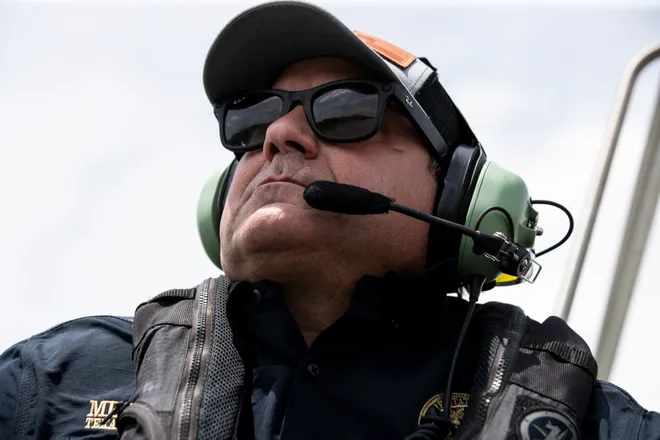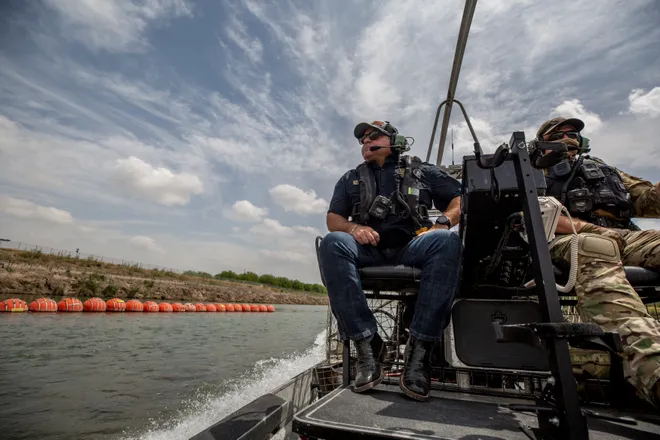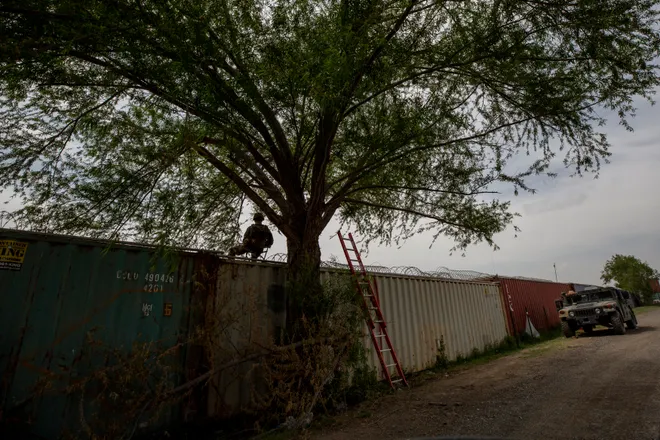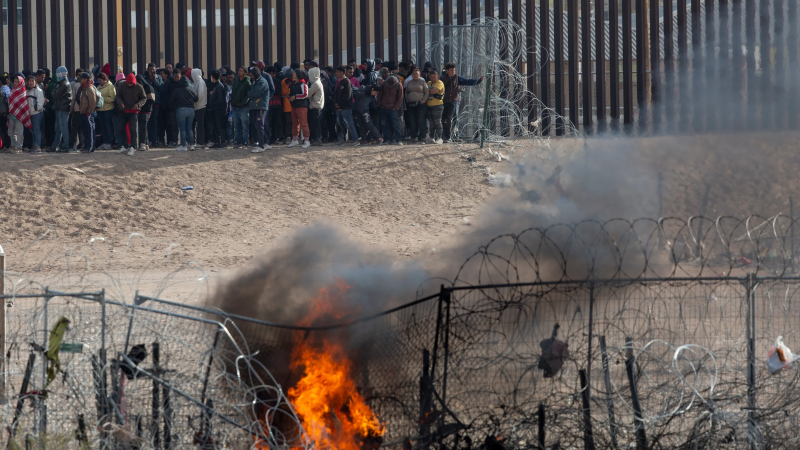Should Americans be worried about the border? The first Texas border czar says yes.
Mike Banks likes to joke that he spent one day in retirement after serving more than two decades in the U.S. Border Patrol. But it only took one phone call from Texas Gov. Greg Abbott to get him back to border enforcement – this time, for the state.
Abbott's Texas is testing the limits of what states can do to control immigration. As the pioneering first "border czar" of Texas, Banks is advising the governor's evolving – and controversial – border security strategy even as the Biden administration fights Texas' tactics in federal court.
The election-season stakes were on display earlier this year when a bipartisan border security bill – endorsed by the White House – failed despite broad voter support. Republicans backed off the bill after Donald Trump publicly blasted it.
In a mobile command vehicle parked near the Rio Grande river in Eagle Pass, Banks spoke to USA TODAY about his views on cartel threats, concertina wire and comprehensive immigration reform. (This interview has been edited for brevity and clarity.)

Polls have shown that voters across the country, even outside of border states, are ranking immigration border security as a top issue. Should they be worried?
Every state has really become a border state. Never in my career have I seen such large numbers entering the country illegally. And so I think we should be worried about it.
First and foremost, we need to separate immigration from border security.
What you have right now is the cartels weaponizing immigration against the forces on the border, whether it be Border Patrol, the state of Texas, any other law enforcement. They're weaponizing the migrants, holding them back, pushing them across at certain times, in order to overwhelm the system.
That now leaves miles and miles of border wide open where they can push through the got-aways, they can push through the hard narcotics, they can push through the high-value targets. So I think it's way beyond time for America to be concerned about our border being as wide open as it is.
What do you mean when you say we need to 'separate immigration from border security'?
It's far past time for the U.S government to come up with comprehensive immigration reform. Immigration reform isn't 'Let's create a crisis at the border, and then you'll just give me whatever I want.'
The left and the right need to sit down and come up with a viable immigration system that works for today's migrants, for what we need in this country for workforce, for what we need for population (growth), for what we need in getting experts into this country.
What we can't do is have open borders in between the ports of entry where anyone can come through. And the federal government is inviting this to continue happening.

Texas is building its own border infrastructure from concertina wire to a 'forward operating base' here in Eagle Pass. What's next? What does the Texas border look like five years from now?
You need the right combination of technology, infrastructure, personnel and consequences. So that's what we're trying to put together as a total package in the state of Texas. We are building state border wall at the exact same specifications that the previous (Trump) administration was building border wall. Does border wall stop everything? No. It's like a lock on anything else. It keeps honest people honest. And it works as a force multiplier. You can control the area with less manpower.
Additionally, I would say that over the next five years... we're going to continue building tactical infrastructure. We're going to continue building border wall. Right now, our current pace is about one mile a week. We're going to put up things like the the border buoy barriers, with the understanding that you don't need a wall from sea to shining sea.

If you look at the numbers... you will see that while Texas owns almost 64% of the entire land mass with Mexico, 1,254 miles, we now account for less than 30% of all the cross-border traffic. (Editor's note: U.S. Customs and Border Protection data show 44% of illegal crossings have occurred in Texas in fiscal 2024 through March.) To me, what that shows is that deterrence does work, that you can deter people from crossing illegally. Right now they're going to the path of least resistance. And the path of least resistance for illegal immigration is California, Arizona, New Mexico.
Do you have any contact with counterparts in Mexico?
We do. We don't communicate at the same level as I did when I was in the Border Patrol, at the federal level. But on the state level, we communicate. There's communications from governor to governor. There's communications from the different state police agencies with our police agencies, with Guardia Nacional and our National Guard. We communicate with Mexico daily, if not multiple times a day.
Is Mexico doing enough to slow the flow of migrants?
Many (Mexican) states along the border... are feeling much the same way Texas is, where the states are being overrun with illegal immigration and being left to fend for themselves on the south side, without the proper assistance from the federal government. So they're stepping up on the south side in these Mexican states and doing what they can to deter illegal immigration, as well.
Is the federal government of Mexico doing enough? No. Is the federal government United States doing enough? No.
Do you envision a state-level Border Patrol? Or will the Texas National Guard be on permanent assignment?
I think the border states definitely have to be involved in border security. I can tell you from the 23 years I was in the Border Patrol, we worked with state military, we worked with state law enforcement (and) the state of Texas. As far as a Texas Border Patrol, I think that's for the legislature and the people of Texas to decide.

We're going to do everything we can to protect Texas and the rest of America. If you go out in (Shelby Park), you will see soldiers from the state of Florida. You will see them from Iowa. You will see them from Indiana. You will see them from North Dakota. Half of the (Republican-led) states in the United States are sending some type of support to the state of Texas, whether it be in the form of law enforcement or National Guard, to help us hold that line. And they're footing their own bill because they understand that what is happening here is going to affect them, whether it be the narcotics, the fentanyl, the opioids, or whether it be the high-value targets.
You know, we're not going to back down. We believe everything we're doing is lawful and within our constitutional rights.
Lauren Villagran can be reached at lvillagran@usatoday.com or on X @laurenvillagran.
Disclaimer: The copyright of this article belongs to the original author. Reposting this article is solely for the purpose of information dissemination and does not constitute any investment advice. If there is any infringement, please contact us immediately. We will make corrections or deletions as necessary. Thank you.






